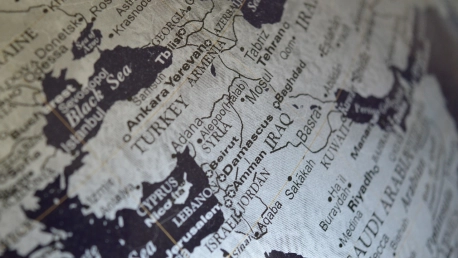As we enter 2020, the Western world, an enduring example of stability and well-being for the rest of the world, seems to be in the grip of a profound political crisis. In the U.K., Prime Minister Boris Johnson led his Conservative Party to victory after being the voice of Brexit. In Italy, the rise of the far-right has a new name: The League. It also has a well-defined purpose: to form a government driven by nationalism that serves the economically depressed. While uncertainty is growing around the world, the US faces an ongoing re-election campaign by President Donald Trump. All these events can be summed up in a single word: change. This, in turn, may have a profound impact on the Middle East and may influence future developments in Iran, Iraq, and Syria.
The US has recently carried out a series of airstrikes against an Iranian-backed militia group in Iraq and Syria in retaliation for an attack that killed a US contractor. At least 25 fighters of paramilitary group Kataib Hezbollah were killed in the strikes, which Iran later called a show of “support for terrorism”. But it is Kataib Hezbollah that is seen as a terrorist organization by the US.
The Road to Conflict
Tensions between the US and Iran started to grow after President Donald Trump pulled out from the nuclear deal with Tehran last year and enforced harsh sanctions on the country. Since Iraq is close to both the US and Iran, the chance of being caught in the middle was high. As tensions rose, a surprise rocket attack in Iraq killed a US contractor and injured several American soldiers. The US held Kataib Hezbollah responsible for the attack and threatened to retaliate.
Secretary of State Mike Pompeo warned Iran to tread carefully as the US would exact retribution if American lives were endangered. After the airstrikes against Kataib Hezbollah, he stated it was a “decisive response that makes clear what President Trump has said for months – which is that we will not stand for the Islamic Republic of Iran taking actions that put American men and women in jeopardy.” US Defense Secretary Mark Esper followed Pompeo’s line by saying that other options have also been considered by President Trump. “We will take additional actions as necessary to ensure that we act in our own self-defense and we deter further bad behavior from militia groups or from Iran,” he added.
The Other Side of the Story
Iran criticized the US after the air raids, saying that the attacks only confirm America’s deceitful allegations of fighting terrorism. Iran’s government spokesman Abbas Mousavi went on to accuse the US of actually “targeting the positions of forces that over the years have inflicted heavy blows to ISIS terrorists.” Mousavi said that America shows constant support for terrorism and denies countries like Iraq their independence and sovereignty. Foreign troops stationed in the region were pointed out by Mousavi as the underlying cause of trouble in the area.
Iran’s government spokesman is not alone in condemning the strikes, as Iraqi Prime Minister Adel Abdul-Mahdi also accused Washington of violating Iraq’s sovereignty and causing increased tensions in the area. The official said his government had previously banned any action by coalition forces or any other forces inside Iraqi borders. The airstrikes are now seen as a violation of Iraqi sovereignty and an important threat to regional security, according to the Iraqi Prime Minister. The Asaib Ahl al-Haq forces in Iraq also called for the withdrawal of all American troops in Iraq, saying US military presence has become a burden for the Iraqi state, as well as a source of tension in the region.
Iraq – The Tension Hotspot of the Middle East
Much like the Western world, Iraq is struggling with nationalism, corruption, and anti-government movements. Hundreds of people have already died following street movements, while an estimated 25,000 have been injured. Even so, protests are likely to continue, probably accompanied by more violence. After the US airstrikes, Kataib Hezbollah spokesman Sayyed Jaafar Al-Husseini threatened the US with a response.
But it was the US that decided to respond first by killing top Iranian general Qasem Soleimani in a Baghdad airstrike. The second most powerful man in Iran after Ayatollah Khamenei was executed while in Iraq, along a convoy of Iraqi militia. The strike took place early on Friday and was directly ordered by US President Donald Trump, who later stated that the action was necessary to stop a war, not to start a war. “I have deep respect for the Iranian people. They are a remarkable people with an incredible heritage and unlimited potential,” the President said.
The end of 2019 proved to be especially stressful for US-Iran relations, with 11 known attacks against Iraqi military bases where US soldiers or diplomats are deployed. Secretary Pompeo said the US will always honor a commitment to take decisive action when American citizens are in danger and that he expects Iran to do the best it can to rejoin the international community. However, Ayatollah Khamenei, the Supreme Leader of Iran, has promised “severe revenge” after the death of Qasem Soleimani.









